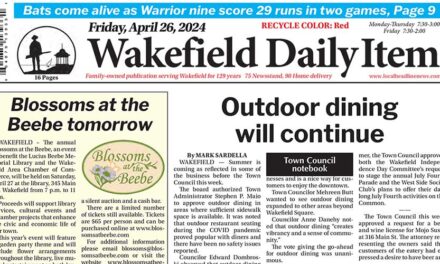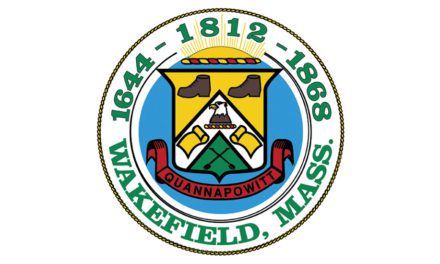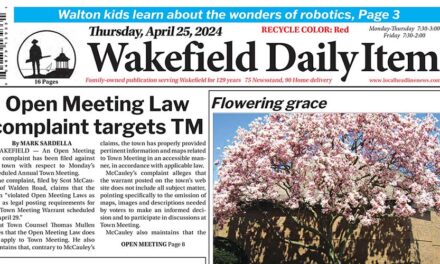Published in the March 28, 2019 edition.
By MARK SARDELLA
WAKEFIELD — With the worldwide recycling market in crisis mode, communities across the country have stopped or reduced recycling, according to DPW Director Richard Stinson. In Massachusetts, many communities have been hit with large recycling “tipping” fees on top of their recycling collection contract charges.
With that in mind, Stinson told the Town Council this week that the town needs to develop a long-term strategy to address the recycling market issues. The town has two years until the current recycling contract expires on Oct. 2, 2021.
“Public Works has been a driver for a strong recycling program since its inception and will continue to be the driver,” Stinson said. “We do not want to see the program stop or be short-changed.”
The town’s recycling program is not in any immediate danger, he said. But in order to sustain it long-term, residents need to be vigilant.
“We need residents’ support in recycling as much as possible and we encourage them to do so,” Stinson said. “However, we need the recycling material to be clean material. We want to eliminate broken glass, plastic bags, plastic straws and other non-recycled items that contaminate recycling loads. Clean recycling loads prevent recycling from being sent to a landfill or an incinerator and also ensure that we are not paying for contaminated recycling loads.”
Stinson explained that a big part of the reason for the crisis in the recycling market is that China has set new standards for acceptable materials that are almost impossible for most communities to meet. In addition, he said, manufacturers have found ways to produce new plastic and packaging material that are cheaper than using recycled plastic.
The topic of recycling was addressed during the DPW director’s presentation of the $1.9 million FY 2020 Refuse and Recycling budget Monday night.
Stinson told the Town Council that the DPW is currently in the process of choosing a new trash collection contractor. The owners of Russell Disposal, Inc., the town’s rubbish collection contractor for the past 20 years, are phasing out their operation in anticipation of retirement, he said. The current contract with Russell expires on Sept. 27, 2019. They did not submit a proposal for next year.
The current year’s cost for rubbish collection is $664,120. Stinson said that he anticipated that the price for FY 2020 will be in the range of $800,000, although that could be negotiated down. He said that the cost of labor and equipment has escalated for refuse collection contractors, driving up the price for municipalities.
Separate from the collection of refuse is the disposal. Stinson estimated next year’s cost for rubbish disposal at $500,112, based on 7,200 tons collected and a “tipping” fee of $69.46 per ton. Stinson noted that in the 1990s, refuse tonnage was between 11,500 and 14,000. Through recycling measures, Stinson noted, that tonnage has been reduced, benefitting the environment and the bottom line.
Moving on to the recycling part of the budget, Stinson reiterated that with more than two years left on its recycling contract, this year’s price is locked in at $405,273.
Stinson addressed the issue of moving to weekly recycling, which some have called for. Currently recycling is picked up every other week. Weekly recycling would increase the cost from $405,273 to $711,200, he said, as the contractor would have to add another truck and another crew. Any savings that might result from increased recycling would be dwarfed by the $305,000 cost increase, Stinson said.
The Yard Waste Program, including Nahant Street Pit openings, curbside collection and leaf and brush processing, is budgeted at $186,440 for FY 2020.
The schedule for the Nahant Street Pit spurred some discussion at this week’s meeting. Stinson noted that the DPW had added 11 days to this year’s Pit schedule for residents to drop off yard waste.
But Town Councilor Edward Dombroski wanted the schedule expanded even further to include every Saturday and alternating Sundays (except on curbside collection weeks and when it conflicts with holidays). He said that he wanted a schedule that people could rely on without having to consult a calendar.
But Stinson pointed out that even with the 11 additional days, some of those days were so slow that it really didn’t make sense to open the facility. But Dombroski countered that a more predictable schedule might well result in more activity.
Stinson estimated that it would add $6,000 to the cost of the Yard Waste Program to adopt the schedule that Dombroski was proposing.
Dombroski made a motion to have the Pit open every Saturday and the second and fourth Sundays of each month (except for curbside collection weeks and holidays). The motion failed, 4-3, with Dombroski, Julie Smith-Galvin and Chairman Peter May in favor. Opposed were Mehreen Butt, Ann Santos, Tony Longo and Paul DiNocco.
Santos suggested approving the budget as presented and revisiting the Yard Waste schedule later. She moved to approve the $1,996,000 Refuse and Recycling budget. That motion carried 6-1, with Dombroski opposed.




